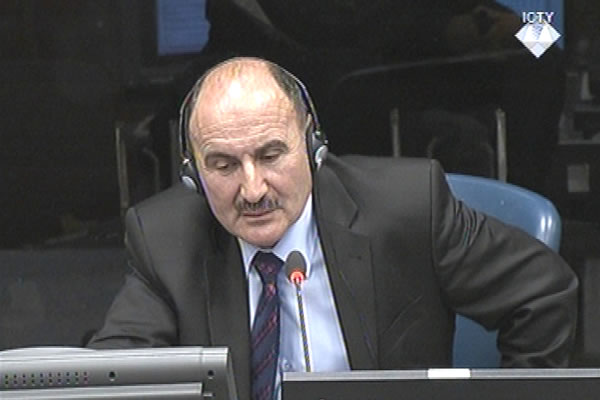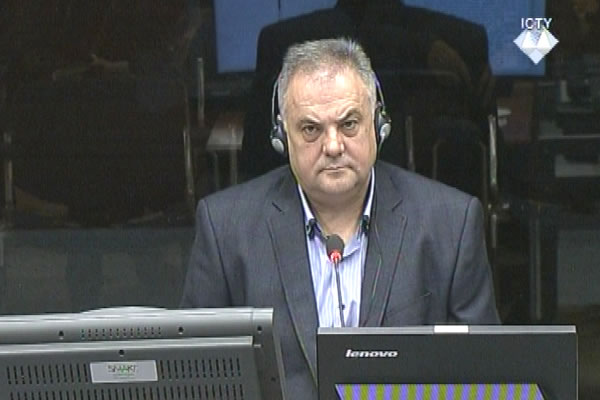Home
EVACUATION ALLOWED, RETURN PROHIBITED
War-time president of the Commission for the Allocation of Property in the Ilidza municipality claimed that the houses and apartments of non-Serb refugees were taken away only temporarily without intent to prevent them to return. The prosecutor invoked the decisions of the municipal authorities from May 1992 ‘allowing the evacuation’ of Muslims and Croats. In April 1993, the municipal authorities issued documents ‘prohibiting the refugees from returning’. The court did not hear the evidence about Mladic’s ‘pulling out his hair’ after the events in Srebrenica
 Slavko Mijanovic, defence witness at Rako Mladic trial
Slavko Mijanovic, defence witness at Rako Mladic trial Today, Ratko Mladic’s defense called Slavko Mijanovic, war-time president of the Commission for the Allocation of Property in the Ilidza municipality. The prosecutor alleges that such municipal bodies were instruments used for the implementation of ethnic cleansing as they handed over to the Serbs the property of non-Serb refugees, in a bid to prevent them from coming back. The defense argued that it was an expedient whose goal was to provide accommodation for the refugees from other regions in the abandoned houses. There was no discriminatory intent.
In his statement to Mladic’s defense, Mijanovic said that in July 1992 the Ilidza war commission adopted an ordinance on the allocation of abandoned property. Based on the ordinance, the commission allocated apartments and houses. The witness stressed that it was only temporary possession. The new lodgers were not allowed to acquire the property, and the old owners could not lose what they owned. By 1993, the Commission issued 3,000 such decisions, the witness said. In a brief examination-in-chief the witness said that after the war the property was returned to the rightful owners.
In the cross-examination, the prosecutor noted that the ordinance the witness’s commission had implemented states thatpersons who didn’t returnto their apartments and houses by 20 May 1992 lost their right to health and pension insurance and to tenancy. Mijanovic didn’t deny that the ordinance put it that way. However, that article ‘was never implemented’, the witness explained.
Furthermore, the ordinance states that property is to be allocated to the families of the Bosnian Serb army and police members. According to the prosecutor, that meant only Serbs could get such property. The witness explained some non-Serbs received property only because they were members of the Serb army and police. The witness recalled a Croat who moved into an abandoned house, and that 15 or 20 persons from mixed marriages were granted the same right. It was ‘statistically insignificant’, the witness admitted, because thousands of Serbs were provided accommodation in the refugee apartments. One such ‘lucky winner’ was Tomislav Kovac, former Bosnian Serb police minister. Kovac was given a three-room apartment in Ilidza in line with the decision signed by the witness.
The prosecutor put it to the witness that the property allocation was done in order to further ethnic cleansing. To prove the allegation, the prosecutor invoked two decisions of the municipal authorities, dated 19 May 1992 and 2 April 1993. In the first document the Crisis Staff concludes that ‘Croats and Muslims were allowed to evacuate from the territory of Ilidza'. The second document, drafted by the War Presidency, ‘prohibits the return for Muslims and Croats for security reasons’. Mijanovic said that everybody was allowed to evacuate, including the non-Serbs. The witness noted that he couldn’t fathom why Muslims and Croats would return to the territory under the Serb control in 1993.
Dusan Todic testified in the first part of today’s hearing. During the war, Todic was assistant to Mladic’s deputy and chief of the VRS Main Staff Manojlo Milovanovic. In his statement to the defense team, Todic spoke about the reaction of the accused to the Srebrenica crimes in the summer of 1995. When Todic accompanied Milovanovic some time between 18 and 20 July 1995, he saw Mladic in the Main Staff headquarters in Crna Rijeka. Mladic was ‘visibly concerned and agitated’, the witness noted. According to Todic, Mladic ‘was pulling out his hair’ and told Milovanovic that ‘something terrible’ had happened. Those who did it were ‘crazy’, Mladic purportedly said. A brief summary of the witness’s statement was read out in court. The defense counsel didn’t have any questions for the witness. When he realized that there was no additional information about Mladic’s ‘bad state’ after the Srebrenica operation, the prosecutor didn’t cross-examine the witness. Todic’s evidence was thus much shorter than usual. It took Todic only about 10 minutes to complete his testimony.
Photos
Linked Reports
- Case : Mladic
- 2014-11-24 ‘SILK ROPE FOR ALIJA’
- 2014-11-24 WITNESS: THERE WERE NO CRIMES IN SUSICA
- 2014-11-20 MLADIC’S WITNESS: MASSACRE IN VELAGICI ‘REVENGE FOR WORLD WAR II’
- 2014-11-26 NO NEED TO LIST CRIMES AGAINST NON-SERBS BECAUSE THEY WERE 'GENERAL KNOWLEDGE'
- 2014-11-27 PRAISE FOR ‘COURAGEOUS AND FAIR’ GENERAL MLADIC
- 2014-12-01 SITUATION IN SREBRENICA BEFORE 1995

